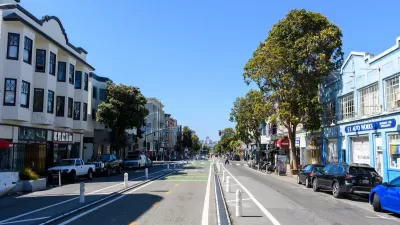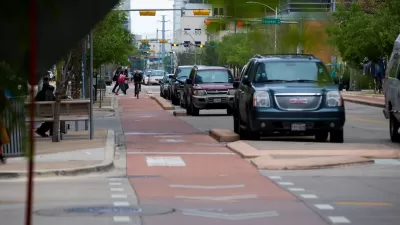A plan to reconfigure Valencia Street between 15th and 23rd streets in San Francisco has been approved despite stiff opposition from community members and bike advocates.

The San Francisco Municipal Transportation Agency (SFMTA) board approved a controversial new bike lane project for Valencia Street. According to an article by Garrett Leahy, the pilot project would reconfigure the entire street, moving current bike lanes on either side of the street to a new two-way bike lane in the center of the street.
The plan is to leave the bike lane in place for one year, at least, after installation.
“Valencia Street is among the most dangerous streets in the city. It is among the 13% of San Francisco streets that account for three-quarters of all traffic deaths and severe crashes, according to data from the city’s public health department as part of a ‘High Injury Network’ study,” according to Leahy.
Bike advocates in the city, however, believe that the center-running bike lane is dangerous. “Transit activist Luke Bornheimer repeated those criticisms and said the design creates a “bike highway” that could discourage stopping or squeeze bicyclists in between traffic, possibly making it unsafe for kids and seniors to use,” according to the article.
As for why the center-running bike lane was necessary, SFMTA officials fold Leahy that space constraints because of commercial loading and parklets made a side-running bike lane plan unfeasible.
FULL STORY: Controversial Bike Lane in Middle of SF’s Valencia Street Approved by Transit Bosses

Planetizen Federal Action Tracker
A weekly monitor of how Trump’s orders and actions are impacting planners and planning in America.

Congressman Proposes Bill to Rename DC Metro “Trump Train”
The Make Autorail Great Again Act would withhold federal funding to the system until the Washington Metropolitan Area Transit Authority (WMATA), rebrands as the Washington Metropolitan Authority for Greater Access (WMAGA).

The Simple Legislative Tool Transforming Vacant Downtowns
In California, Michigan and Georgia, an easy win is bringing dollars — and delight — back to city centers.

The States Losing Rural Delivery Rooms at an Alarming Pace
In some states, as few as 9% of rural hospitals still deliver babies. As a result, rising pre-term births, no adequate pre-term care and "harrowing" close calls are a growing reality.

The Small South Asian Republic Going all in on EVs
Thanks to one simple policy change less than five years ago, 65% of new cars in this Himalayan country are now electric.

DC Backpedals on Bike Lane Protection, Swaps Barriers for Paint
Citing aesthetic concerns, the city is removing the concrete barriers and flexposts that once separated Arizona Avenue cyclists from motor vehicles.
Urban Design for Planners 1: Software Tools
This six-course series explores essential urban design concepts using open source software and equips planners with the tools they need to participate fully in the urban design process.
Planning for Universal Design
Learn the tools for implementing Universal Design in planning regulations.
Smith Gee Studio
City of Charlotte
City of Camden Redevelopment Agency
City of Astoria
Transportation Research & Education Center (TREC) at Portland State University
US High Speed Rail Association
City of Camden Redevelopment Agency
Municipality of Princeton (NJ)





























